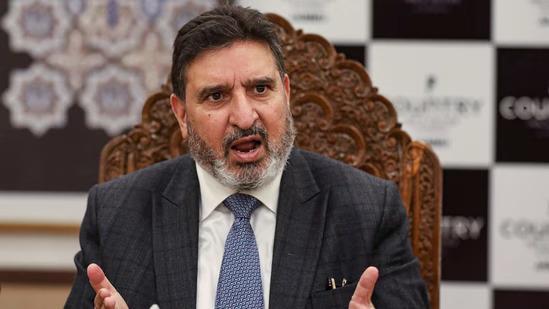
Enemies of Peace Won’t be Happy to See Peace in J&K: Altaf Bukhari
The recent terrorist attack in Pahalgam, Jammu and Kashmir, has left the entire nation in a state of shock and grief. The attack, which claimed the lives of at least 26 people, is a stark reminder of the ongoing struggle for peace and security in the region. In the aftermath of this tragic event, Altaf Bukhari, the President of Apni Party in Jammu and Kashmir, has spoken out against the attack, condemning it in the strongest possible terms.
Bukhari, in a statement, said that those who are enemies of peace will never be happy to see peace in the region. He described the attack as a “murder of humanity” and urged that lessons needed to be learned from such incidents. His words are a stark reminder of the gravity of the situation and the need for all stakeholders to come together to promote peace and stability in the region.
The attack in Pahalgam is just the latest in a long string of incidents that have plagued Jammu and Kashmir in recent years. Despite the efforts of the government and security forces to maintain law and order, terrorist groups continue to perpetrate violence and destruction in the region. The fact that such attacks are still happening is a clear indication that more needs to be done to address the root causes of the conflict and to find a lasting solution.
One of the major challenges facing the region is the presence of terrorist groups, such as the Lashkar-e-Taiba and the Jaish-e-Mohammad, which are believed to be backed by external forces. These groups have been responsible for numerous attacks on civilians and security personnel, and have shown no hesitation in using violence to achieve their goals.
Another major challenge is the lack of trust and understanding between different communities in the region. The divide between Hindus and Muslims, and between different ethnic groups, is a significant obstacle to peace and reconciliation. Until these differences can be bridged, it is unlikely that the region will be able to achieve lasting peace.
So, what can be done to address these challenges and promote peace in Jammu and Kashmir? First and foremost, it is essential to address the root causes of the conflict. This will require a sustained effort to promote understanding and dialogue between different communities, and to address the economic and social grievances that are driving the conflict.
The government must also take a more proactive role in addressing the security situation in the region. This will require increased investment in the security forces and a more coordinated approach to tackling terrorist groups. It will also require the government to work closely with other stakeholders, including civil society and the international community, to promote peace and stability.
Civil society also has a crucial role to play in promoting peace in Jammu and Kashmir. This can include initiatives such as dialogue and reconciliation programs, as well as efforts to promote economic development and social welfare. Civil society organizations can also play a key role in promoting human rights and the rule of law, and in advocating for the rights of marginalized communities.
Finally, the international community must also play a role in promoting peace in Jammu and Kashmir. This can include diplomatic initiatives aimed at promoting dialogue and reconciliation between different parties, as well as economic and humanitarian assistance to support the region’s development.
In conclusion, the recent terrorist attack in Pahalgam, Jammu and Kashmir, is a stark reminder of the ongoing struggle for peace and security in the region. Altaf Bukhari’s words, that “those who are enemies of peace will never be happy to see peace in J&K”, are a stark reminder of the challenges that lie ahead. However, they also offer hope that, with the right approach and a commitment to promoting peace and reconciliation, it is possible to overcome these challenges and build a brighter future for the people of Jammu and Kashmir.






